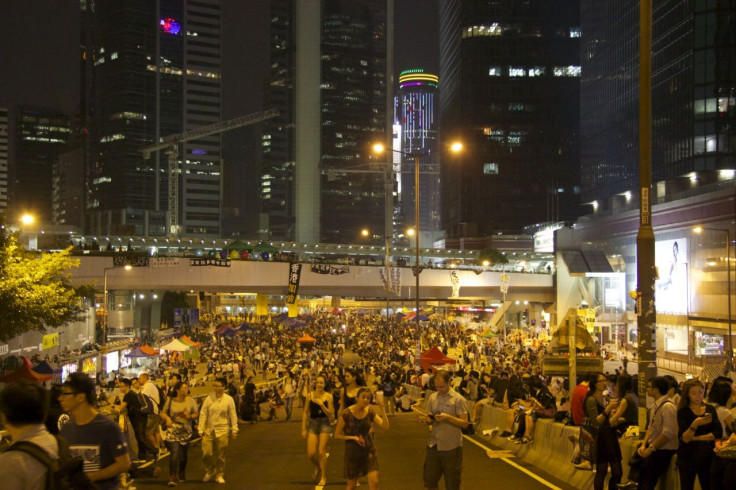Chinese Media Floods Mainland News With Anti-Occupy Hong Kong Coverage

China is changing its tactics when it comes to addressing the ongoing pro-democracy protests in Hong Kong. State media has shifted from a mainstream media and social media blackout of coverage for Hong Kong’s Occupy Central movement, which has garnered support from thousands in Hong Kong and overseas, to a concerted, aggressive effort to flood local media with anti-Occupy criticism.
Today, the University of Hong Kong’s China Media Project, a blog dedicated to monitoring the country’s relationship with media, pointed out that China’s state-run news agency, Xinhua, flooded China’s newspapers with a new report from Hong Kong, focusing on the disorder that has followed the protests and the perceived growing amount of opposition that Occupy Central is receiving. This particular Xinhua report represented 60 percent of today’s Occupy coverage in Chinese media.
“The illegal gathering called ‘Occupy Central’ has entered its 15th day, with large amounts of people still assembling in Admiralty, Mong Kok and other areas,” the report, which appeared in the Beijing Daily, said. “Various quarters of Hong Kong society have urged the occupiers to leave the streets immediately, allowing the lives of city residents to return to normal.”
The report, published in Chinese on various platforms, goes on to explain that since Oct. 3, over 60 events and meetings planned by the government have been canceled, delayed or relocated, also adding that in upcoming weeks, over 80 events have been scheduled with at least a dozen already being rescheduled or canceled.
Instead of taking reports from Xinhua, the Global Times offered a handful of its own critiques that undermine the impact of the movement -- for instance, an op-ed titled “‘Occupy Central’ Will Not Go Down In History, Only Notoriety.” In a separate article, the Global Times pinned the movement on Western influences and demanded accountability in what Chinese media perceive as criminal behavior by the people.
“Who is providing ‘black money for it?’ the article asks. “Which people should be held criminally liable?”
As the movement reaches the three-week milestone, the shift in offensive criticism is not surprising, some experts say, and is geared toward winning Chinese over by placing increased attention on the economic consequences and social disruption of the protests.
“There’s a recognition that the government can’t completely stem the flow of information from Hong Kong to the mainland, so it’s better [to] try to control the messaging as much as possible,” Dr. Michal Meidan, associate fellow of the Asia Programme at Chatham House, the Royal Institute of International Affairs, and director the policy institute's China Matters, a research and advisory group, said in an interview. “Playing up the chaos that could ensue, the inconvenience caused to daily lives and businesses, as well as the role foreign governments (especially the U.S.) are playing resonates with public onion.”
The Global Times adopted this narrative as early as Oct. 4, when an article published said that the work behind the Occupy Central movement “bears the shadow of the West.” Chinese media bases these claims on the argument that protesters were encouraged by foreign grant organizations like the Madeleine Albright-founded National Democratic Institute and the National Endowment of Democracy.
Media chatter and conversation inside the so-called great firewall has been drastically limited compared with the coverage in Hong Kong -- or anywhere else in the world. Aside from heavy-handed control over state-run media, Chinese Internet censors unsurprisingly have blocked the phrase “Occupy Central,” along with other related search terms, and photos on the ground from social media sites and applications such as Weibo and WeChat.
Beijing has left Hong Kong’s leadership -- namely, Chief Executive Leung Chun-ying and Chief Secretary for Administration Carrie Lam -- to handle the unrest as protests enter their third week. Though the Occupy movement has done its part to disrupt some of the Hong Kong government’s meetings, Dr. Meidan says that Beijing will be less amicable to protests affecting the central government’s fourth plenary meeting, taking place between Oct. 20 and Oct. 23, a meeting dedicated to designating party governance.
© Copyright IBTimes 2024. All rights reserved.












